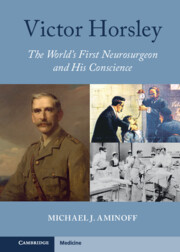Book contents
- Victor Horsley
- Victor Horsley
- Copyright page
- Dedication
- Contents
- Preface
- Acknowledgments
- Chapter 1 Early Days
- Chapter 2 The Other Side of Gower Street
- Chapter 3 At the Brown
- Chapter 4 Dividing the Indivisible: The Localization of Cortical Functions
- Chapter 5 The Making of a Specialty
- Chapter 6 The Grammar of Neurosurgery: Technical Underpinnings
- Chapter 7 The Neurosurgery of Specific Disorders
- Chapter 8 Measures of the Man
- Chapter 9 The Politics of Protection
- Chapter 10 Not So Trivial Pursuits: The Slide into Politics
- Chapter 11 Antivivisectionist Claims and Clamor
- Chapter 12 Bitter Tears: Horsley and the Suffragist Movement
- Chapter 13 Last Orders: The Temperance Movement
- Chapter 14 Syphilis and the Public Health
- Chapter 15 A Surgeon Goes to War
- Chapter 16 Aftermaths and Appraisals
- Book part
- Index
- References
Chapter 12 - Bitter Tears: Horsley and the Suffragist Movement
Published online by Cambridge University Press: 06 January 2022
- Victor Horsley
- Victor Horsley
- Copyright page
- Dedication
- Contents
- Preface
- Acknowledgments
- Chapter 1 Early Days
- Chapter 2 The Other Side of Gower Street
- Chapter 3 At the Brown
- Chapter 4 Dividing the Indivisible: The Localization of Cortical Functions
- Chapter 5 The Making of a Specialty
- Chapter 6 The Grammar of Neurosurgery: Technical Underpinnings
- Chapter 7 The Neurosurgery of Specific Disorders
- Chapter 8 Measures of the Man
- Chapter 9 The Politics of Protection
- Chapter 10 Not So Trivial Pursuits: The Slide into Politics
- Chapter 11 Antivivisectionist Claims and Clamor
- Chapter 12 Bitter Tears: Horsley and the Suffragist Movement
- Chapter 13 Last Orders: The Temperance Movement
- Chapter 14 Syphilis and the Public Health
- Chapter 15 A Surgeon Goes to War
- Chapter 16 Aftermaths and Appraisals
- Book part
- Index
- References
Summary
Although many women did not work outside the home in late Victorian and Edwardian Britain, more options than domestic service, factory work, or nursing were becoming available for those seeking a job. Shop assistants and clerical workers were in demand, and new opportunities had arisen in teaching and a few other professions. By 1901, for example, there were more than two hundred female doctors, almost a tenfold increase over the number twenty years earlier. Nevertheless, women continued to face disadvantages and prejudices. They therefore agitated for greater involvement in public affairs, the right to vote in parliamentary elections, and to receive the same pay as men for equal work. Both Eldred and Victor Horsley shared these wishes, although Eldred may well have influenced the extent and intensity of her husband’s views.1 Victor became involved in supporting the suffragists to an extent that involved him in controversy with professional colleagues and the government, and contributed to his failed attempt to be elected to parliament (Chapter 10). It was thought – wrongly as it happened – that he supported the lawless methods adopted by some of the more activist suffragists.
- Type
- Chapter
- Information
- Victor HorsleyThe World's First Neurosurgeon and His Conscience, pp. 137 - 142Publisher: Cambridge University PressPrint publication year: 2022



